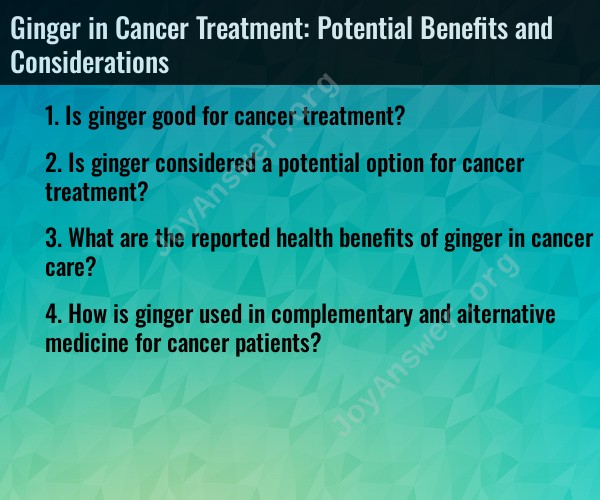Is ginger good for cancer treatment?
Ginger is a widely studied herb that has been investigated for its potential benefits in cancer treatment and supportive care. While ginger has shown some promising properties in preclinical and small-scale clinical studies, it's important to note that ginger should not be considered a standalone or primary treatment for cancer. Here are some potential benefits and considerations regarding ginger in the context of cancer:
Potential Benefits:
Anti-Inflammatory Properties: Ginger contains compounds, such as gingerol, that have anti-inflammatory properties. Chronic inflammation is associated with cancer development, and reducing inflammation may have some benefits.
Nausea and Vomiting Relief: Ginger is well-known for its anti-nausea effects and has been used to alleviate chemotherapy-induced nausea and vomiting in cancer patients. Some studies support its use for this purpose.
Pain Management: Ginger may help with pain management, which can be a concern for cancer patients. It may have analgesic properties, potentially reducing pain associated with cancer or its treatment.
Considerations:
Complementary Approach: Ginger is best considered as a complementary approach to cancer treatment. It should not be used as a replacement for conventional cancer therapies such as surgery, radiation, or chemotherapy.
Consult Your Healthcare Provider: If you are a cancer patient or considering ginger as part of your treatment or supportive care, it's essential to consult with your oncologist or healthcare provider. They can provide guidance and ensure that ginger does not interfere with your ongoing treatments.
Potential Interactions: Ginger may interact with certain medications. Your healthcare provider can help determine whether ginger is safe and appropriate for your specific situation.
Dosage and Form: The optimal dosage and form (e.g., fresh ginger, ginger supplements, ginger tea) can vary. Your healthcare provider can provide guidance on the most suitable form and amount.
Individual Responses: Not everyone responds to ginger in the same way. Some people may benefit from ginger's properties, while others may not experience significant relief or may have side effects.
Safety: In moderate amounts, ginger is generally considered safe for most people. However, excessive consumption of ginger may lead to side effects such as gastrointestinal discomfort. Always use ginger in moderation and follow your healthcare provider's recommendations.
Scientific Research: While ginger has shown promise in some studies, more research is needed to establish its exact mechanisms of action and its effectiveness in different cancer-related symptoms and conditions.
In summary, ginger may offer potential benefits for cancer patients, particularly in terms of alleviating nausea and vomiting and managing inflammation and pain. However, it should be approached as part of a comprehensive care plan, and its use should be discussed with a healthcare provider who can provide guidance tailored to your specific needs and circumstances. It is not a substitute for conventional cancer treatment.
Is ginger considered a potential option for cancer treatment?
Ginger is a spice that has been used for centuries in traditional medicine. It has a number of potential health benefits, including anti-inflammatory, antioxidant, and anticancer properties.
Ginger is not currently considered a standard treatment for cancer, but it is being studied as a potential complementary and alternative treatment. Some studies have shown that ginger may help to reduce cancer cell growth, promote apoptosis (cell death), and improve symptoms such as nausea and vomiting.
More research is needed to determine the safety and efficacy of ginger for cancer treatment. However, ginger is generally considered to be safe for most people to consume.
What are the reported health benefits of ginger in cancer care?
Ginger has been reported to have a number of health benefits in cancer care, including:
- Reducing nausea and vomiting caused by chemotherapy
- Reducing pain and inflammation
- Improving appetite
- Boosting the immune system
- Reducing the risk of cancer recurrence
Some studies have also shown that ginger may help to kill cancer cells and prevent the growth of new tumors.
How is ginger used in complementary and alternative medicine for cancer patients?
Ginger is used in a variety of ways in complementary and alternative medicine for cancer patients. It can be taken in the form of capsules, powder, tea, or extracts. Ginger can also be applied topically to the skin to relieve pain and inflammation.
Some common ways that ginger is used in complementary and alternative medicine for cancer patients include:
- Drinking ginger tea to reduce nausea and vomiting
- Taking ginger capsules to reduce pain and inflammation
- Applying ginger topically to the skin to relieve pain and inflammation
- Eating ginger in food to boost the immune system and reduce the risk of cancer recurrence
It is important to note that ginger should not be used as a substitute for conventional cancer treatment. Ginger can interact with certain medications, so it is important to talk to your doctor before using ginger if you are taking any medications.













